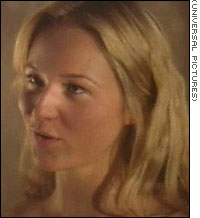 War Buffs Will Go Along for "Ride"
War Buffs Will Go Along for "Ride"
Mike Clark
USA TODAY
Ken Burns and Scarlett O'Hara
notwithstanding, there haven't been as many
Civil War movies as one might think - at least
in proportion to the lasting historical
significance of the tragedy. Director Ang
Lee's long and lumpy Ride With the Devil (2.5 stars
out of four) is redeemed some by
unromanticized authenticity, but it's likely to
be appreciated most (and perhaps exclusively) by subject enthusiasts just
happy to see the film exist.
Headlined by the not-always-dynamic acting mix of Skeet Ulrich, Tobey
Maguire and pop singer Jewel, the film takes a Confederate viewpoint in its
portrayal of the makeshift Bushwhackers - a band of guerrillas who burned
out and murdered Union sympathizers, just as their Northern Jayhawker
opposites did in the reverse. In the course of this 2¼-hour epic, these
ragtag causists don't accomplish very much - and they know it. This is one
of the movie's key points but also one of its dramatic liabilities.
Jake (Maguire) has a German-emigre and pro-Union father who is killed
by Yankees well aware of his son's sentiments. Jack (Ulrich) is the son of a
plantation owner, George (Simon Baker), a young edition of a Southern
gentleman, and - in the movie's most interesting role, though belatedly so -
Holt (Jeffrey Wright) is an ex-slave loyal to the Bushwhackers' cause
because George purchased and freed him.
There are several peripheral characters, but those four and a war widow
(Jewel) are the principals upon which the movie depends.
Lee's direction seems colder and more impersonal than in any of his
previous pictures, which include three charming Taiwanese comedies
(Pushing Hands, The Wedding Banquet, Eat Drink Man Woman) as
well as Sense and Sensibility and The Ice Storm. Despite some capable
action scenes (including an elaborately staged attack on Lawrence, Kan.)
and the overall scope of Frederick (Blue Velvet) Elmes' cinematography,
the movie starts to engage only in the later going when Wright's role takes
on prominence and Maguire begins to amuse when he gets trapped in a
relationship with the widowed Jewel.
Their courtship (if that's what it is) isn't all that compelling, but it does
relieve some of the frequent monotony (which, in fairness, probably reflects
how the Bushwhackers' lives probably were). Jewel is more like an acting
zircon because she just can't project, but at least she looks the part, and
her novelty value isn't unwelcome. Though Elvis got to sing in his Civil War
movie (screen debut Love Me Tender), Lee has wisely resisted
shoehorning in any Jewel vocals until the end credits - though a song break
would have been a given four decades ago.
